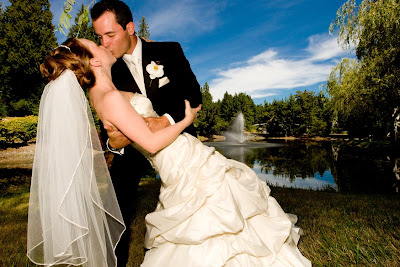 1. What is your video style―cinematic or documentary?
1. What is your video style―cinematic or documentary?If you want the videographer to create an artistic movie of the wedding, you will want someone who can apply feature-film techniques. If you want a traditional video chronicling the day from start to finish, go with someone who is skilled in shooting in a documentary style. Don’t expect a professional who makes traditional wedding videos to put together a cinematic film.
2. What is your storytelling approach?
Make sure you and the videographer are on the same page about how you want the day documented. Ask to see samples of his or her recent work.
3. What type of coverage do you offer?
The number of hours a videographer will shoot and the film he or she will use vary by vendor. Many pros offer a nice variety of options. Pick one that works best for the wedding’s schedule, style, and budget. Once you select the package, the coverage should be detailed in the contract.
4. What type of video or film format do you use?
Most videographers today shoot on digital film and produce DVDs (as opposed to VHS tapes) that offer extremely sharp images and last for more than 30 years. Some shoot on Super 8 (eight-millimeter) film, or digital film that gives the same nostalgic, vintage effect as Super 8 but is not as expensive.
5. How will the audio (sound) be handled?
You won’t want an annoying microphone hanging over you or your guests throughout the day. Nowadays, most quality video cameras feature microphones that pick up clear sound. If a videographer wants to record the best audio during the vows, he or she will place a wireless mic on the officiant or groom― never on the bride, as it might affect the wedding dress.
6. What types of cameras/lighting will you use?
Hire a professional who owns the most advanced and modern equipment to ensure the best picture quality. The latest video cameras are more light-sensitive, so the videographer doesn’t have to bring in harsh, glaring, or obtrusive lighting.
7. How many other weddings will you be shooting on my wedding day?
You will want to know that you’ll have the videographer’s full attention and time. If the person is overbooked, he or she may rush through your event. Be sure your wedding doesn’t overlap with another.
8. Will you coordinate with my photographer?
It’s a good idea to have the videographer and photographer meet, even for just a few minutes before the ceremony, to collaborate on the video and photography coverage. You do not want them competing for shots, which can create an uneasy atmosphere.
9. What is your editing process?
Some videographers use an in-camera editing technique to cut costs. But this process, in which the person tries to shoot the raw footage as cleanly as possible to reduce editing time later, can produce a low-quality video. Wedding videos should be professionally edited postproduction, after the film negative is uploaded onto a computer. Once the film is on the computer, the videographer can edit on-screen. Pros usually take three hours to edit one hour of video footage.
10. Do you offer HD-ready video?
In the age of high-definition television, this is good to know. If you are investing in a quality wedding video, you’ll most likely want to receive the most up-to-date product, which offers the sharpest pictures and will be compatible with any high-tech entertainment system that you want to set up.
Tags:
No comments:
Post a Comment